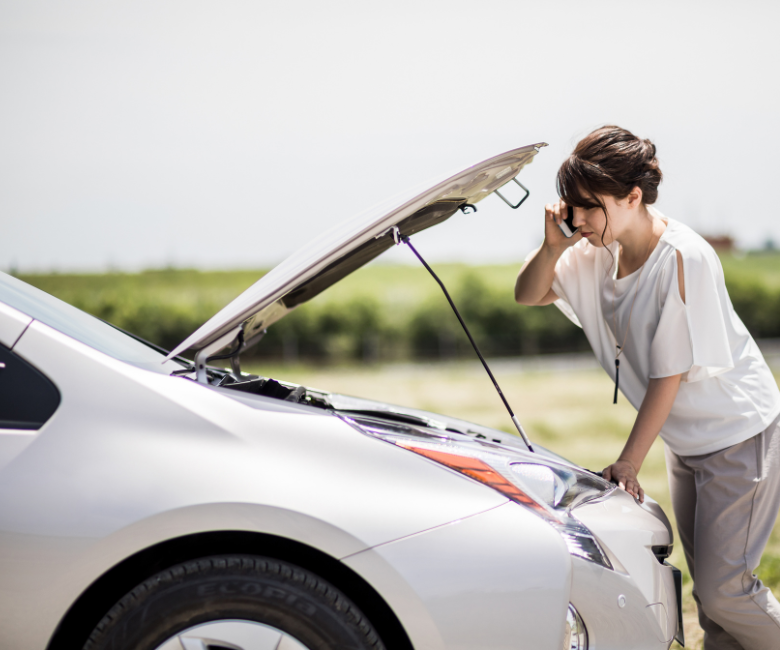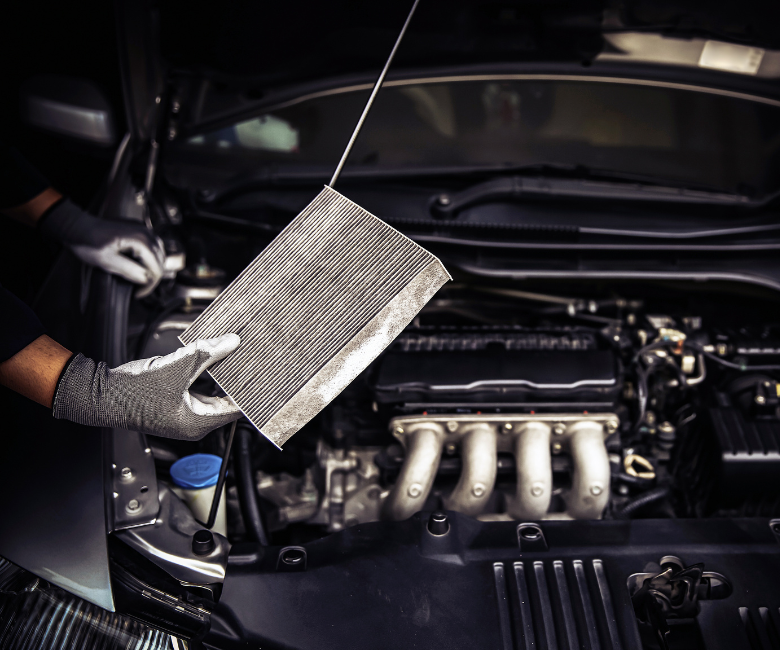
Is Your Car Ready for Extreme Summer Temps?
- Vehicle Maintenance
- PEAK
- July 9, 2024
Summer has arrived, and it's time to prep it for the hot temps. Keep reading to learn how to add coolant, check air pressure and more.
Summer is here, and it's shaping up to be a hot one. The planet has just endured 12 consecutive months of record-breaking heat, setting the stage for a blazing season that could take a toll on your vehicle if you don't properly prepare it.
The last place you want to find yourself on a scorching-hot day is on a remote roadside next to a broken-down car. You can avoid that situation by following a few easy but important summertime prep tips for your vehicle.


How Hot Weather Stresses Your Vehicle
Summer heat can negatively affect many vehicle systems and components, including:
- Engine. In extreme summer weather, your engine becomes more likely to overheat. An overheated engine can lead to a long list of serious mechanical problems, from a failed head gasket to a cracked engine block, so it's definitely something you want to avoid.
- Tires. Like your engine, your tires can also overheat from driving on searing-hot road surfaces if they aren't inflated to manufacturer specifications. When tires get too hot, a blowout becomes more likely.
- Battery. Hot weather can make your battery fluid evaporate faster, which could lead to corrosion and performance losses.
- Air conditioning. If your AC hasn't been serviced in a while, it might struggle to cool your car efficiently.
You can avoid these problems with some routine preventative maintenance — some of which you can perform on your own.
7 Maintenance Tasks to Prep Your Car for Summer
Check these items off your to-do list before temperatures hit their max and you'll stand a great chance of having a problem-free driving season.
Get the right engine oil
By default, most passenger vehicles use what's known as multigrade motor oil. These products are formulated to perform across a broad temperature range, but you might want to consider a specialized alternative if you live in a particularly hot climate.
First, check manufacturer motor oil recommendations by consulting your owner's manual. It will be the best source of information about which products to use in your vehicle. Then, consider going with a 40- or 50-weight oil if you'll be driving a lot in excessive heat. You can identify these motor oils by checking the viscosity rating printed on the jug.
Viscosity ratings have two components, which are usually separated by a dash. The first component has a number with the letter W, and the second is just a number. For example, you might encounter a motor oil with a 0W-30 rating (or just 0W30 if the manufacturer doesn't use a dash).
That first component — the one with the W — indicates the oil's viscosity rating in winter temperatures. Right now, you don't need to worry about that one. It's the second component you want to focus on.
The second numeric component indicates oil viscosity at operating temperatures. Motor oils with operating temperature ratings (also known as "oil weights") in the 40-50 range perform better in high-heat conditions, making them a good choice for hot climates.


Change your air filter
Engine and cabin air filters trap debris and particulate matter, preventing these contaminants from circulating through your vehicle. You should change these filters at least once a year or every 12,000–15,000 miles.
Changing an air filter is a pretty straightforward job, and you can do it on your own in about 10–20 minutes. Check your owner's manual: it will tell you where to find your air filter, how to access it, and what kind of replacement filter to buy.
Most vehicles secure their air filters in a housing sealed by clips or screws. Detach any hoses that connect to the housing, undo the fasteners, open the housing, lift out the soiled filter, and replace it with a new one. Reattach the fasteners and the hoses, and you're done!
Check your coolant and other fluids
Coolants combine antifreeze with water. Antifreeze is a bit of a misnomer: while it does stop your car coolant fluid from freezing in frigid temperatures, it also prevents boiling in excessive heat.
PEAK has your coolant and antifreeze needs covered, with special formulations for every vehicle type under the sun. You can also use PEAK's economical, high-performance Ready Use Green formula for older cars and light-duty trucks. PEAK also offers eco-friendly coolants as well as patented formulations that deliver guaranteed lifetime protection for any make or model.
Your owner's manual will explain how to add coolant to your car. While you're at it, check your transmission, power steering, and brake fluids to make sure they're at the right levels. Our DIY maintenance checklist explains how to perform these checks.
Inspect and test your battery
First, inspect your battery to see if there's caked-on white, blue, or green residue around the terminals. If so, you've got corrosion. You can remove it yourself using a specialized cleaning product, which you can pick up from your local automotive retailer.
Your engine needs to be cool before you clean your battery, so make sure it's been off for at least half an hour before you start. Then:
- Remove the battery's connecting cables, starting with black and followed by red.
- Spray the cleaner on the corroded area.
- Put on thick gloves and use a wire brush to scrub the corrosion away.
- Reconnect the battery cables when you're done.
If your battery is more than three years old, it's a wise idea to have it tested to see how much life it has left. You can get this quick check performed by a trained technician. If the juice is getting low, replace the battery.


Service your AC
Properly functioning air conditioning is more than just a comfort issue. If you're too hot behind the wheel, dehydration and fatigue can occur. These pose health and safety risks.
Have a technician check your AC, especially if you notice it struggling to cool your car on a hot day. Your system might need what's known as "regassing," which will restore your AC's full performance.
Optimize your tire pressure
Tires with too little or too much air can suffer blowouts on hot road surfaces. A blowout can leave you stranded at best, or cause an accident at worst.
Don't rely on the figures printed on the tire sidewall for pressure specifications. Instead, check your owner's manual for your vehicle's correct pressure range. Your manual will also explain how to check air pressure in your tires. Add or remove air as necessary, and don't forget to do the same to the spare tire in your trunk.
Change your wiper blades
Strong, high-performing wiper blades blast through more than rain: when paired with premium windshield wash, they also help maintain peak visibility by removing dust and other airborne debris from your glass.
If you haven't changed your wiper blades in the past six months, now is a great time to get caught up. PEAK makes a complete lineup of high-performance specialty wiper blades for all seasons, with our Max Vision and Silicone Platinum products making especially strong choices for summertime. You'll find complete installation instructions for all PEAK wiper blades in our DIY Hub video library.
A Last Note About Summer Driving
As a safety reminder, never leave children or pets alone in a parked car, especially during the summer. Vehicle interiors can quickly reach unsafe temperatures on hot, sunny days, and avoidable tragedies can easily occur if you're not careful.
Finally, make sure your vehicle has a fully stocked emergency kit. Our Ultimate Road Trip Checklist has complete details on everything to include in yours. Have a great, safe summer!

